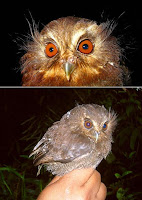
March 23, 2007—A tiny bird so rare and unusual that its scientific name means "strange owl" has been spotted for the first time in the wild, scientists announced yesterday.
Conservationists working in Peru got their first natural glimpse of the long-whiskered owlet last month while working in a private mountain reserve.
The species wasn't even known to exist until 1976, and since then the only known living specimens have been those caught in nets at night.
"Seeing the long-whiskered owlet is a huge thrill," said David Geale of Asociación Ecosistemas Andinos, who was part of the research team, in a press statement.
The American Bird Conservancy, which partnered in the research, described the sighting as "a holy grail" of bird biology.
As few as 250 of the owlets are thought to exist, scientists said, and the birds are as distinctive as they are rare.
With their diminutive size, bright orange eyes, and wild, wispy facial feathers, the dainty birds belong to their own genus, dubbed Xenoglaux, or "strange owl."
The owlets owe much of their survival to the remoteness of their dense mountain habitat, the researchers said. But as human activity encroaches on Peru's northern forests, the birds' future looks dimmer.
"Due to the rapid destruction of its forest habitat and its tiny range, it is inferred that the species is in serious decline," Geale said.
"Until recently, the owlets key habitat was completely unprotected."
—Blake de Pastino




No comments:
Post a Comment